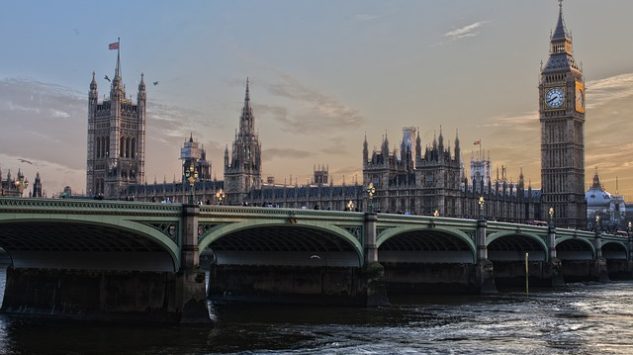Issue Briefs

On October 15, Britain stops being a democracy
September 30 2019
By Martin Hutchinson
By a vote of 298 to 56 on September 4 and a second similar vote on September 9, the House of Commons voted to approve an election on October 15, yet because of a supermajority provision unknown to the British constitution, Parliament was not dissolved. A Parliament you cannot dissolve is no longer a democratic institution, any more than was the Rump Parliament after Pride’s Purge. On October 15, therefore, Britain will turn the clock back 370 years, into the world of Praise-God Barebone. It will then need a Cromwell, or better still a Restoration to return it to democracy and legitimate rule.
Troubled history
There have historically been two occasions in which Parliament perpetuated itself, in the way it did on September 4 and September 9. The first was in 1641, when the Long Parliament passed an ordinance preventing King Charles I from dissolving it. That led to the Civil War, after which the New Model Army, a creation of Parliament without Royal assent, in the form of a force led by Colonel Thomas Pride, on December 6, 1648 expelled all those Members who would not consent to the execution of the King, creating the Rump Parliament. The Rump Parliament through a Council of State then ruled England very badly for four years, before being dissolved by Oliver Cromwell on April 20, 1653, with the memorable words “You have sat here too long for any good you may have been doing lately. Depart, I say, and let us have done with you. In the name of God, go!”
Cromwell
Cromwell then ruled for the next five years, rather more democratically than the Rump Parliament, since he convened no fewer than three Parliaments, one unsatisfactory entirely nominated one, known as Barebone’s Parliament after the eponymous Praise-God, then two more satisfactory Protectorate Parliaments, elected on franchises similar but not identical to those used by fully legitimate Parliaments from 1295 till 1832. Cromwell’s son Richard succeeded him on his death, summoning a third Protectorate Parliament. Then the Army removed Richard Cromwell, dissolved the Protectorate Parliament and recalled the Rump. The Rump took steps to re-democratize itself, recalling the members expelled in 1648, thus “enlarging itself into a Gigot” before dissolving itself and calling free elections. Those produced a more Royalist Convention Parliament that had the sense to recall Charles II.
Another deviation
That history is well known. It is less well known (because almost all historians are Whiggish in tendency) that Parliament again deviated from legitimacy in 1716, when by the Septennial Act the Whig-controlled Parliament voted to extend its life for an additional four years beyond the three years permitted by the Triennial Act of 1694. This was one of the key pieces of legislation by which the Whigs under George I and George II turned Britain into a one-party state, which continued until George III introduced the Tory Earl of Bute into government in 1761. The Whigs also attempted to lock in control of the house of Lords, by the Peerage Bill of 1719, preventing the King from ever creating more than six new peers, but by that time the Whig party itself was split and the bill was blocked by an alliance of the Tories and the followers of Sir Robert Walpole, then in opposition. Thus, from March 1718 (three years after the previous election) until May 1722 (the end of the next election) Parliament was wholly illegitimate, having perpetuated itself as it did earlier this month.
Supermajority can call elections
The legislation that permitted the latest usurpation of power, the Fixed-Term Parliaments Act of 2011, was a piece of Tony Blair-like meddling with the British constitution carried out by David Cameron, who as a Tory ought to have known better. It included a provision that elections could be called by a supermajority in parliament, a requirement entirely unknown in 724 years of British Parliamentary government. If Britain had the hereditary House of Lords as a supreme judicial authority, headed by some august Lord Eldon-like figure, or a proper long-established Supreme Court with properly supervised nominations, like the United States, that provision would have been rejected as unconstitutional when it was passed. Alas, Britain has only a gimcrack “Supreme Court” designed by that master of inept Constitutional tinkering Tony Blair, a man whose Constitutional arrangements had all the quality and long-term durability of Harold Macmillan’s council tenements.
Extending the Brexit deadline
The one legitimate part of this mess is the Benn Act, by which Johnson must ask the EU for a three-month extension of the Brexit deadline date, from October 31 to January 31, 2020. That was passed by both Houses of Parliament (albeit called up for debate through a misuse of the Speaker’s powers by John Bercow) and has received Royal Assent. However, it only mandates Johnson to request a 3-month extension of the Brexit deadline from the EU; it does not mandate that they will grant it, and indeed they need unanimous consent of the EU’s 27 non-British members to do so.
Illegitimate political system
On October 15, Britain will thus be heading into a zone occupied only twice in its history, and not for 300 years: that of an illegitimate political system. It is already clear that opponents of Brexit will be very uninhibited in taking advantage of the lack of constraints in such a system; Speaker John Bercow has preened himself repeatedly in the media for his willingness to do so. The Liberal Democrats have agreed to ignore altogether the democratic wishes of the electorate, producing “heady optimism” in the Economist. Jeremy Corbyn’s Labour Party, on the other hand, are promising the electorate that they will respect the wishes of the electorate in a second referendum – why the electorate should believe this is unclear, since they have not respected the results of the first one.
A messy road ahead for Britain
Excited speculation in the bigoted “quality” press is of a “Ministry of all the Talentless” of opponents of Brexit, led perhaps by the ineffable Kenneth Clarke, which would attempt to govern the country for a year, after which another election could be held, by which time, it is hoped, Boris Johnson and Nigel Farage would be thoroughly discredited.
Meanwhile, given that his opponents will be exploiting every loophole they can, there is one avenue for Johnson to get a “no-deal” Brexit on October 31. A quiet word with the leaders of either Hungary or Poland could lead to a refusal by the EU to grant any extension, even if they were minded to do so, which they do not appear to be. Britain will have friends in the EU, even after its departure; it should use them. Naturally, any such recalcitrance by Hungary or Poland (or, preferably both, for safety’s sake) would bring down the wrath of the EU on them; it could also however make the EU negotiate seriously at last in the ten days remaining before October 31, which they have not done so far.
Is there a workable deal with the EU?
Johnson has shown himself only too ready to sign up to the feeble Theresa May deal with the EU, subject to removal of the “Irish backstop.” There is thus a modest chance that the odious Michel Barnier will be overruled by the national leaders, who are after all theoretically his masters, and an agreement will be reached before October 31. However, on balance a “no deal” Brexit is the best alternative, getting Britain fully out of the EU with no strings attached, and saving Britain most if not all of the 39 million pounds “Danegeld” extorted from it in the May Agreement.
Brexit by October 31?
The most important objective for Johnson should be to get Britain out of the EU, at least half-way by some variant of the May Agreement, on October 31. Almost equally important is to secure himself a proper majority by a General Election. By expelling from the party the 21 Conservative MPs who voted for the Benn Act, and rejoicing at the departure of Amber Rudd, Johnson has ensured that the Conservative party will fight the election as a united force. Moreover, if re-elected, it will then be able to govern for several years as a united government, without incessant MP defections and junior minister resignations, since it will have ridded the party of the Blairites in sheep’s clothing that had been imposed on it by David Cameron’s destructive candidates’ “A-list” of 2007-15.
Cutting corners
To achieve those two objectives, constitutional corners may have to be cut. From October 15, there will be no reason not to cut them, to get Brexit and an election and thereby restore Britain to full democracy. For the election, a pact should be made with Nigel Farage’s Brexit Party, giving the Brexit Party a clear run at every non-Tory seat north of the Humber, say. The Downing Street advisor who told the media that Farage was “unfit to be in the government” should be defenestrated – this is supposedly coming from the party that inflicted on us 6½ years of John Major, a man whose education and general sophistication made Farage look like Cicero.
It will take a combination of firm adherence to principle, intelligence, cool nerve and low cunning to get Britain out of the EU and into a solid long-term Conservative government. A mix of Cromwell, Charles II and George III should do very nicely for the job.
The views and opinions expressed in this issue brief are those of the author.
 |
Martin Hutchinson is a GPI Fellow. He was a merchant banker with more than 25 years’ experience before moving into financial journalism. Since October 2000 he has been writing “The Bear’s Lair,” a weekly financial and economic column. He earned his undergraduate degree in mathematics from Trinity College, Cambridge, and an MBA from Harvard Business School. |
This article was originally published on the True Blue Will Never Stain http://www.tbwns.com